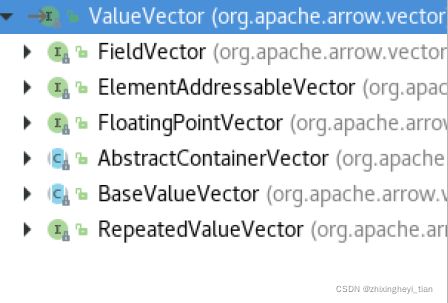Spark 之 ArrowColumnVector
ArrowColumnVector 直接继承 ColumnVector,而ColumnVector 只有 Get 方法
构造函数
public ArrowColumnVector(ValueVector vector) {
this(ArrowUtils.fromArrowField(vector.getField()));
initAccessor(vector);
}
ArrowColumnVector(DataType type) {
super(type);
}
void initAccessor(ValueVector vector) {
if (vector instanceof BitVector) {
accessor = new BooleanAccessor((BitVector) vector);
} else if (vector instanceof TinyIntVector) {
accessor = new ByteAccessor((TinyIntVector) vector);
} else if (vector instanceof SmallIntVector) {
accessor = new ShortAccessor((SmallIntVector) vector);
} else if (vector instanceof IntVector) {
accessor = new IntAccessor((IntVector) vector);
} else if (vector instanceof BigIntVector) {
accessor = new LongAccessor((BigIntVector) vector);
} else if (vector instanceof Float4Vector) {
accessor = new FloatAccessor((Float4Vector) vector);
} else if (vector instanceof Float8Vector) {
accessor = new DoubleAccessor((Float8Vector) vector);
} else if (vector instanceof DecimalVector) {
accessor = new DecimalAccessor((DecimalVector) vector);
} else if (vector instanceof VarCharVector) {
accessor = new StringAccessor((VarCharVector) vector);
} else if (vector instanceof VarBinaryVector) {
accessor = new BinaryAccessor((VarBinaryVector) vector);
} else if (vector instanceof DateDayVector) {
accessor = new DateAccessor((DateDayVector) vector);
} else if (vector instanceof TimeStampMicroTZVector) {
accessor = new TimestampAccessor((TimeStampMicroTZVector) vector);
} else if (vector instanceof TimeStampMicroVector) {
accessor = new TimestampNTZAccessor((TimeStampMicroVector) vector);
} else if (vector instanceof MapVector) {
MapVector mapVector = (MapVector) vector;
accessor = new MapAccessor(mapVector);
} else if (vector instanceof ListVector) {
ListVector listVector = (ListVector) vector;
accessor = new ArrayAccessor(listVector);
} else if (vector instanceof StructVector) {
StructVector structVector = (StructVector) vector;
accessor = new StructAccessor(structVector);
childColumns = new ArrowColumnVector[structVector.size()];
for (int i = 0; i < childColumns.length; ++i) {
childColumns[i] = new ArrowColumnVector(structVector.getVectorById(i));
}
} else if (vector instanceof NullVector) {
accessor = new NullAccessor((NullVector) vector);
} else if (vector instanceof IntervalYearVector) {
accessor = new IntervalYearAccessor((IntervalYearVector) vector);
} else if (vector instanceof DurationVector) {
accessor = new DurationAccessor((DurationVector) vector);
} else {
throw new UnsupportedOperationException();
}
}
ArrowVectorAccessor
ArrowVectorAccessor 是对 ValueVector 套了一层总的接口,总的意义不大

abstract static class ArrowVectorAccessor {
final ValueVector vector;
ArrowVectorAccessor(ValueVector vector) {
this.vector = vector;
}
// TODO: should be final after removing ArrayAccessor workaround
boolean isNullAt(int rowId) {
return vector.isNull(rowId);
}
final int getNullCount() {
return vector.getNullCount();
}
final void close() {
vector.close();
}
boolean getBoolean(int rowId) {
throw new UnsupportedOperationException();
}
byte getByte(int rowId) {
throw new UnsupportedOperationException();
}
short getShort(int rowId) {
throw new UnsupportedOperationException();
}
int getInt(int rowId) {
throw new UnsupportedOperationException();
}
long getLong(int rowId) {
throw new UnsupportedOperationException();
}
float getFloat(int rowId) {
throw new UnsupportedOperationException();
}
double getDouble(int rowId) {
throw new UnsupportedOperationException();
}
Decimal getDecimal(int rowId, int precision, int scale) {
throw new UnsupportedOperationException();
}
UTF8String getUTF8String(int rowId) {
throw new UnsupportedOperationException();
}
byte[] getBinary(int rowId) {
throw new UnsupportedOperationException();
}
ColumnarArray getArray(int rowId) {
throw new UnsupportedOperationException();
}
ColumnarMap getMap(int rowId) {
throw new UnsupportedOperationException();
}
}
UT
test("int") {
val allocator = ArrowUtils.rootAllocator.newChildAllocator("int", 0, Long.MaxValue)
val vector = ArrowUtils.toArrowField("int", IntegerType, nullable = true, null)
.createVector(allocator).asInstanceOf[IntVector]
vector.allocateNew()
(0 until 10).foreach { i =>
vector.setSafe(i, i)
}
vector.setNull(10)
vector.setValueCount(11)
val columnVector = new ArrowColumnVector(vector)
assert(columnVector.dataType === IntegerType)
assert(columnVector.hasNull)
assert(columnVector.numNulls === 1)
(0 until 10).foreach { i =>
assert(columnVector.getInt(i) === i)
}
assert(columnVector.isNullAt(10))
assert(columnVector.getInts(0, 10) === (0 until 10))
columnVector.close()
allocator.close()
}
test("array") {
val allocator = ArrowUtils.rootAllocator.newChildAllocator("array", 0, Long.MaxValue)
val vector = ArrowUtils.toArrowField("array", ArrayType(IntegerType), nullable = true, null)
.createVector(allocator).asInstanceOf[ListVector]
vector.allocateNew()
val elementVector = vector.getDataVector().asInstanceOf[IntVector]
// [1, 2]
vector.startNewValue(0)
elementVector.setSafe(0, 1)
elementVector.setSafe(1, 2)
vector.endValue(0, 2)
// [3, null, 5]
vector.startNewValue(1)
elementVector.setSafe(2, 3)
elementVector.setNull(3)
elementVector.setSafe(4, 5)
vector.endValue(1, 3)
// null
// []
vector.startNewValue(3)
vector.endValue(3, 0)
elementVector.setValueCount(5)
vector.setValueCount(4)
val columnVector = new ArrowColumnVector(vector)
assert(columnVector.dataType === ArrayType(IntegerType))
assert(columnVector.hasNull)
assert(columnVector.numNulls === 1)
val array0 = columnVector.getArray(0)
assert(array0.numElements() === 2)
assert(array0.getInt(0) === 1)
assert(array0.getInt(1) === 2)
val array1 = columnVector.getArray(1)
assert(array1.numElements() === 3)
assert(array1.getInt(0) === 3)
assert(array1.isNullAt(1))
assert(array1.getInt(2) === 5)
assert(columnVector.isNullAt(2))
val array3 = columnVector.getArray(3)
assert(array3.numElements() === 0)
columnVector.close()
allocator.close()
}
test("create columnar batch from Arrow column vectors") {
val allocator = ArrowUtils.rootAllocator.newChildAllocator("int", 0, Long.MaxValue)
val vector1 = ArrowUtils.toArrowField("int1", IntegerType, nullable = true, null)
.createVector(allocator).asInstanceOf[IntVector]
vector1.allocateNew()
val vector2 = ArrowUtils.toArrowField("int2", IntegerType, nullable = true, null)
.createVector(allocator).asInstanceOf[IntVector]
vector2.allocateNew()
(0 until 10).foreach { i =>
vector1.setSafe(i, i)
vector2.setSafe(i + 1, i)
}
vector1.setNull(10)
vector1.setValueCount(11)
vector2.setNull(0)
vector2.setValueCount(11)
val columnVectors = Seq(new ArrowColumnVector(vector1), new ArrowColumnVector(vector2))
val schema = StructType(Seq(StructField("int1", IntegerType), StructField("int2", IntegerType)))
val batch = new ColumnarBatch(columnVectors.toArray)
batch.setNumRows(11)
assert(batch.numCols() == 2)
assert(batch.numRows() == 11)
val rowIter = batch.rowIterator().asScala
rowIter.zipWithIndex.foreach { case (row, i) =>
if (i == 10) {
assert(row.isNullAt(0))
} else {
assert(row.getInt(0) == i)
}
if (i == 0) {
assert(row.isNullAt(1))
} else {
assert(row.getInt(1) == i - 1)
}
}
batch.close()
allocator.close()
}